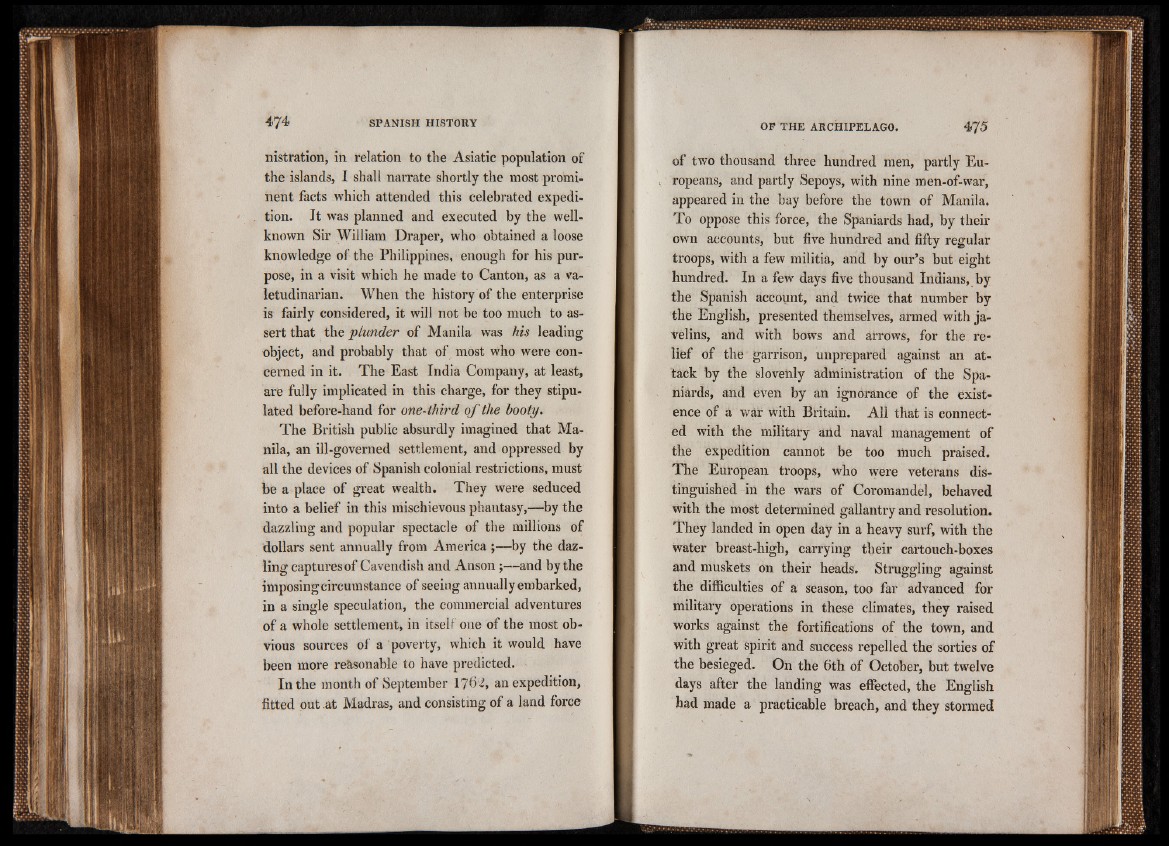
nistration, in relation to the Asiatic population of
the islands, I shall narrate shortly the most prominent
facts which attended this celebrated expedition.
It was planned and executed by the well-
known Sir William Draper, who obtained a loose
knowledge of the Philippines, enough for his purpose,
in a visit which he made to Canton, as a valetudinarian.
When the history of the enterprise
is fairlv considered, it will not * . be too much to as- sert that the 'plunder of Manila was his leading
object, and probably that of most who were concerned
in it. The East India Company, at least,
are fully implicated in this charge, for they stipulated
before-hand for one-third of the booty.
The British public absurdly imagined that Manila,
an ill-governed settlement, and oppressed by
all the devices of Spanish colonial restrictions, must
be a place of great wealth. They were seduced
into a belief in this mischievous phantasy,—by the
dazzling and popular spectacle of the millions of
dollars sent annually from America ;—by the daz-
ling captures of Cavendish and Anson ;—and by the
imposing circumstance of seeing annually embarked,
in a single speculation, the commercial adventures
of a whole settlement, in itself one of the most obvious
sources of a poverty, which it would have
been more reasonable to have predicted.
In the month of September 176*2, an expedition,
fitted out at Madras, and consisting of a land force
of two thousand three hundred men, partly Europeans,
and partly Sepoys, with nine men-of-war,
appeared in the bay before the town of Manila.
To oppose this force, the Spaniards had, by their
own accounts, but five hundred and fifty regular
troops, with a few militia, and by our’s but eight
hundred. In a few days five thousand Indians, by
the Spanish aceoimt, and twice that number by
the English, presented thettlselves, armed with javelins,
and with bows and arrows, for the relief
of the garrison, unprepared against an attack
by the slovenly administration of the Spaniards,
and even by an ignorance of the existence
of a war With Britain. All that is connected
with the military arid naval management of
the expedition cannot be too much praised.
The European troops, who were veterans distinguished
in the wars of Coromandel, behaved
with the most determined gallantry and resolution.
They landed in open day in a heavy surf, with the
water breast-high, carrying their cartouch-boxes
and muskets on their heads. Struggling against
the difficulties of a season, too far advanced for
military operations in these climates, they raised
works against the fortifications of the town, and
with great spirit and success repelled the sorties of
the besieged. On the 6th of October, but twelve
days after the landing was effected, the English
had made a practicable breach, and they stormed